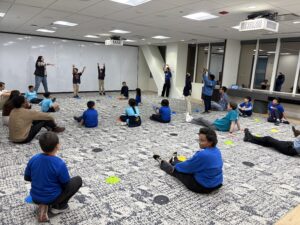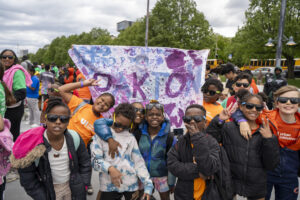The Chicago Tribune reporter Barbara Mahany features UI participant Keyshawn Steele and UI friend and supporter Mawi Asgedom sharing tales of the thigns that transform a space into some place magical:
Keyshawn Steele
Where he dwells: A row house in Cabrini-Green, the once-storied public housing on Chicago’s Near North Side that, like so many so-called “housing projects,” has been labeled a “warehouse for the poor.” Keyshawn, who is 11, doesn’t see it that way. He’s one of the lucky ones; he lives with both his parents, his older brother and two older sisters in a house where he can close the door and count on countless little comforts that tell him he is loved.
What makes it home: “I can relax. No one can interrupt me, no one can make me mad. Sometimes I fall asleep. I start dreaming on my blanket.”
Keyshawn was a baby when his family moved to Cabrini. But his mama, LaTonya, learned right away, “If you don’t raise your kids, the streets will.” And so she set out to make a home where, “when I put the key in the door, everything else that happened all day, no matter how hard or bad, it has disappeared. Once I cross the threshold, I’m at home with Momma, Daddy, Sister, Brother.”
Whether it’s the can of Pringles waiting on his dresser, or the TV tuned to Nickelodeon, his favorite channel, when he walks in from school, or the little pot of rice cooking just for him, because he likes it best, Keyshawn is wrapped in his mama’s devotion.
“When we got home,” LaTonya recalls of her own growing up, “it was like we were in a whole world by ourselves.”
And so it is, in the humble Cabrini row house the Steeles call home.
Mawi Asgedom
Where he dwells: A two-bedroom duplex in a two-flat in Chicago’s Roscoe Village, one he shares with his wife, Erin, and newborn son, Sawyer. Asgedom was only 3 when the 30-year civil war in Ethiopia forced him to flee his village in the dark of night with his mother, brother and baby sister, a 10-week journey by foot, camel and mule that brought them to a refugee camp in Sudan. Eventually resettled in Wheaton, he went on to graduate from Harvard University and has an MBA from Northwestern University’s Kellogg School of Management. He now works across America as a teen educator, with a character-building program called Mental Karate, is a motivational speaker, and author of four books, including his best-selling self-published memoir, “Of Beetles and Angels: A Boy’s Remarkable Journey from a Refugee Camp to Harvard” (Little, Brown, 192 pages, $9.99).
What makes it home: “It’s the place where I have my books; when I can sit in a chair, glance across at my beautiful wife and baby boy, and lose myself in those books. I know without a shadow of a doubt, I am going to be in a comforting place.”
Asgedom remembers little about his childhood home in the dusty village of Adi Wahla, but he does remember, after loading a donkey for the journey into darkness, his mother laying her hands on the white outside walls of the house they were leaving, “feeling its heartbeat—feeling her own heartbeat—then kissing it, knowing she might never see it again.”
For 10 weeks, the four of them trekked village to village through the wilderness, sleeping on or under a plastic tarp, and then survived three years in a disease-infested Sudanese refugee camp.
“One of the Greeks wrote that the greatest sorrow is the sorrow of the exile,” says the 32-year-old Asgedom. “It’s not just the physical landmarks—say, Sears Tower, or the lake—but this huge cultural landscape, the invisible internal landscape that consists of all these cultural habits that are as much home as the physical. It’s all those little things that you will miss.
“Home—Ethiopia—is this place in your heart. It’s being able to go outside and hear your native language. It’s being able to go to a party and dance in the way you know to dance. We dance with our shoulders in Ethiopia.”
It was one small moment in the night, just six years ago in his dry African countryside, when he realized the immense power of what he calls “those little things” that so deeply define home.
“I went back after 23 years, and at 4 in the morning I was sitting in my grandmother’s home—I couldn’t sleep because of goats and chickens going crazy. I got up and was reading one of my fantasy books. Outside the window, I heard a little kid speaking my language. That’s what home is—that little insignificant detail that you take for granted. It, and the other hundred million details that you take for granted, that make home.
“Imagine if that’s no longer there?”
And so, says Asgedom, “that invisible internal landscape of home means more to me than the average person because I’ve brutally been forced to understand what it’s like not to have it.” And for the new father, who already makes sure his baby’s room is filled with books and a map of the world, it is in the comfort of a little cove off the kitchen, where his shelves of books are tucked, that he finds his solace at the end of each long day. “That’s home to me. That means more than what the outside of my house looks like, because it’s where the comfort comes.”
Copyright © 2009, Chicago Tribune



